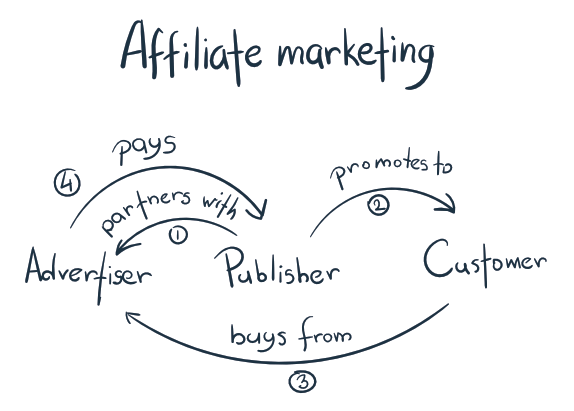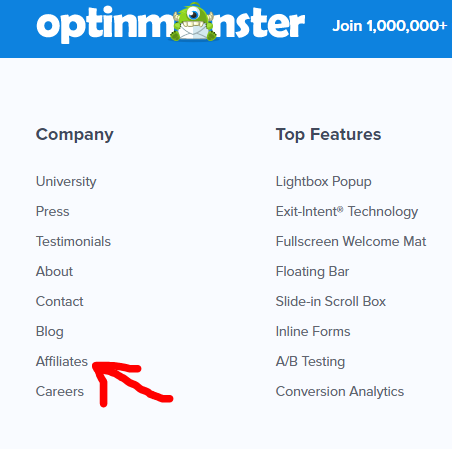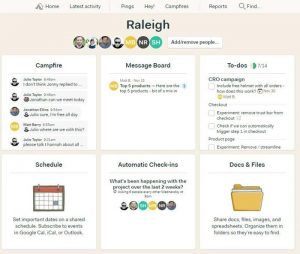Do you want to make money from home with affiliate marketing? The truth is, you can make a decent living with an affiliate website. However, despite the phrase “passive income,” it takes plenty of time and effort to become a successful affiliate marketer.
Affiliate marketing, in a nutshell, is a strategy where a publisher (you) earns a commission by working with businesses that want more traffic or sales. Your job is to convince customers to click your affiliate link, which leads them to the advertisers’ website. If the consumer buys a product, you’ve just earned a commission. Below is a visual that shows how the process works.

If you’re new to the world of affiliate marketing, stick around. We’re going to explore five tips that will help you grow your website and build a fanbase that’s eagerly waiting for your next post.
Decide on a Niche
The first thing you should do is decide on the niche you’re going to cover on your website. There are endless possibilities. You can promote beauty products, video games, pet supplies, and everything in between.
As a general rule, we suggest sticking to one general category and make sure it’s something that you’re passionate about. The reason for this decision is simple; you’re more likely to do your best work when you’re focused on something you already love.
There are other benefits, as well. If you’re focused on one topic, you’re more likely to understand your target audience and consistently create fantastic content that will keep them coming back time and time again.
Switching topics and product genres can deter your audience from checking your website. Imagine if one week you were promoting pet supplies, and the next, you promote skincare products. It’s not hard to imagine the confusion on your readers’ faces when they land on your page expecting one thing, but seeing a bunch of posts totally unrelated to what attracted them to your site.
Find Affiliate Partners
Now that you know your niche, it’s time to start thinking carefully about the affiliate partners you’ll promote on your website. Some people work with Amazon’s affiliate program because it allows them to put virtually anything on their website on your site with an affiliate link.
Many new marketers use Amazon as a jumping-off point because they can easily add and track affiliate links from one site. Plus, with the virtually endless list of products, you’ll have no problem finding new items in your niche that you can put in a post.
Don’t let this advice deter you away from reaching out to other companies that have affiliate programs. If you look at the footer of most websites, you’ll likely see a link like the one in the example below.

Once you click on affiliates, the business will give you the option to read their rules, apply, and learn more about the program. In most cases, stick to products you’ve used and enjoyed; otherwise, your writing might feel forced, which can turn people away from your site.
As your affiliate site grows, you can expand your reach and start looking for other partners in your niche.
Understand Mobile Marketing Best Practices
Mobile marketing is more important now than ever before. There are an estimated 3 billion-plus people who own a mobile device. We use our smartphones for browsing the web for information, checking our email, shopping, and much more.
If you’re just starting an affiliate website, it’s vital that you understand the impact mobile devices have on consumers’ buying decisions. For instance, did you know that mobile users are 127% more likely to buy a product online versus someone using a desktop PC? In other words, if your website is slow or unresponsive, you can expect to lose potential sales from mobile users.
There are several ways you can make your website and emails more accessible for mobile users. The first thing you should do is work on a mobile responsive design for your website. Pages not optimized for mobile devices can take longer to load, appear disorganized, and overall damper UX.
Similarly, when building your email list, you should always make sure that your emails look good on mobile devices. Shortening your title, adding alt text to images, and avoiding image-heavy CTAs can have a positive impact on your subscribers, which will improve the success of your affiliate strategy.
Ask for Feedback
One of the neat tricks we’ve seen affiliate marketers use on their website and social media profiles deals with gathering feedback from consumers. After you start building a small following, consider adding a survey to your website. Use this as an opportunity to ask people what kind of topics or products they want to learn more about in the future.
Your survey can be as specific or broad as you want. For example, if you’re an affiliate marketer selling video games from Amazon, you should ask consumers what game they are excited for in the future. After gathering enough actionable feedback, you can start creating content where that product is available for purchase through your website.
Now when the game releases and visitors go to your website, they will see their feedback manifested in an informative and fun piece of content. User engagement is a massive part of growing your affiliate business. You might not have the flexibility of someone who owns and sells a product, but you can undoubtedly fine-tune your marketing strategy by asking for customer feedback.
Track Your Results
As you gain more traction, make sure you’re checking your on-site analytics. Examining consumer behavior on your site, as well as the links they are clicking, can help you make informed decisions about the direction of your website and products.
If you notice that some of your products have been around for months, but no one is clicking the links, it might be time to go back to the drawing board and find new affiliate partners. On the other hand, this could be an opportunity to flex your creative muscles and work on a long-form blog post that gives consumers a reason to click your affiliate link.
When you first start, the process of creating an affiliate website can seem daunting at first. If you spend time learning about your niche, finding great products, and building a solid customer experience, you’ll have no problem starting a career as an affiliate marketer.
Digital & Social Articles on Business 2 Community
(69)
Report Post









